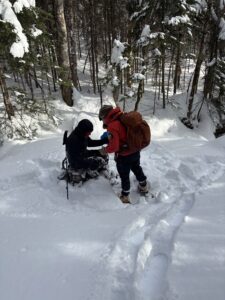Checking in on the park
Adirondack Council ‘State of the Park’ report ranks actions in the Adirondacks
SARANAC LAKE — The Adirondack Council has released its 44th “State of the Park” report — a comprehensive view of what has happened in terms of the Adirondacks’ health, habitability and human interaction in the past year.
“It directly highlights how decisions and policies directly affect the Adirondacks,” Adirondack Council Executive Director Raul Aguirre said.
The environmental watchdog nonprofit turned 50 this year. Council Communications Director John Sheehan said they tried to sum up the themes of their work, from 1975 to today.
“There were some interesting echoes,” he said.
He said some of the hard-fought victories of the past century are returning as issues again, through new means or through roll-backs of past work.
The federal government got nearly universal thumbs-down. Local government got all thumbs-up. The state government got a mixture of both.
To read the full report, go to tinyurl.com/mv6dwwkr.
–
Federal
–
The federal government got mostly thumbs-down for “policy changes that increase taxpayer-funded subsidies for high-polluting fossil fuels and defund environmental research.”
The report dings President Donald Trump for again withdrawing from the Paris Climate Accord.
It criticizes the Trump administration for “dismantling” pollution and weather monitoring systems.
“The One Big Beautiful Bill Act passed by Congress in July included deep cuts in environmental and public health spending,” the report states. “The bill made cuts in environmental programs designed to detect and prevent pollution, including acid rain, smog and fine particle pollution.”
Gov. Kathy Hochul got a thumbs-up for investing millions of dollars into the state’s air quality and weather network.
“The Governor urged New Yorkers to rely on the state’s air quality monitoring and extreme weather forecasting, predicting that federal counterparts will not remain reliable,” the report states.
Sen. Chuck Schumer, D-New York, got a thumbs-up for advocating for Homeland Security to restore a $3 million grant for the Mesonet weather warning system based at the University at Albany. This restoration has not happened.
At the same time that monitoring is cut, the report says the U.S. Environmental Protection Agency is proposing to roll back limits on mercury emissions and greenhouse gas regulations from coal power plants in an effort to increase coal burning for electric power. Sheehan said they’re worried this could bring back acid rain. He also remembers the day when it was not safe for anyone who could get pregnant to eat fish caught in Adirondack waters, because of the mercury content.
A graph shows the progress made on reducing air pollutants since 1990. In the past 35 years, nitrogen oxides have dropped 22%, volatile organic compounds have dropped 88%, direct particulate matter measuring 2.5 microns or less has dropped 59% and sulfur dioxide has dropped 25%.
The report criticizes a U.S. Department of Agriculture plan to repeal a policy keeping 45 million acres of national forest in Vermont, New Hampshire and the west from being fragmented by road construction, logging and development. Sheehan said this would make wildlife migration deadly for endangered species.
It also criticizes the USDA for deleting information on climate change from its website. This information was restored after a lawsuit from farming and environmental groups. The USDA got another ding for stopping reimbursements to farmers who invested in clean energy technology upgrades, which Sheehan says hurts farmers, consumers and the environment.
The report criticizes the Trump administration’s firing of all members of the Federal Emergency Management Agency’s dam safety board without appointing new ones. It cites a report from the Adirondack Explorer, which found that of 500 Adirondack dams, 94 are considered “high hazards.”
The report also says that the decrease in Canadian tourists from the U.S.’ tariff war with its northern neighbor endangers local economies. The report says border crossings into New York fell 30% in May and 21% in June from their 2024 levels — a total of 376,000 fewer travelers in June. Nationwide, the report says federal officials estimate this could result in $2 billion lost in spending and 14,000 jobs at risk.
The U.S. Supreme Court got a thumbs-up for maintaining 7-2 that challenges to EPA rules are required to be heard in the D.C. Court of Appeals, instead of other courts.
“The D.C. Circuit has the greatest expertise and experience in cases involving the Clean Air Act and the environmental standards derived from it,” the report states. “The D.C. Circuit is also meant to be free from influence by local industries.”
But, on the same day, SCOTUS denied this same D.C. court requirement for air quality cases involving power companies.
In January, the D.C. Court of Appeals stopped a 2020 rule that allowed railcars to carry liquefied natural gas, a ruling the Council supports. The report references a 2013 train derailment in Quebec, which killed 47 people and incinerated around half of Lac-Megantic’s downtown. After that disaster, the report says Canadian crude oil trains were rerouted to lines passing through the Adirondacks, along Lake Champlain, where there are many schools, day cares and communities nearby.
–
State
–
Hochul got a thumbs-up for approving a Forest Ranger retirement benefits package closer to what state troopers get. They can now retire at age 65 with full benefits after 20 years instead of 25. She had previously vetoed this change.
But she got a thumbs-down for vetoing a wildlife roadway crossing bill, which aimed to decrease vehicle-animal collisions. The state Department of Transportation did get a $323,000 federal grant though, to do this work.
The state budget got props, with both Hochul and the legislature being commended for funding green goals — an additional $25 million into the Environmental Protection Fund, which is now $425 million; $500 million for clean drinking water grants; $2 million for the Survey of Climate and Adirondack Lake Ecosystems; $1 million for a long-requested carrying capacity study of the Saranac Chain of Lakes; $42 million for open space protection; $50 million for state land stewardship; $18 million for invasive species prevention and eradication; $1.6 million for the Timbuctoo Institute which brings kids from New York City to the Adirondacks; $10 million for visitor safety and wilderness protection in the Adirondacks and Catskills; $10 million for new APA headquarters, bringing the total project cost to nearly $40 million; $2 million for a permanent exhibit at the Adirondack Experience museum on African American life in the Adirondacks and $250,000 each for the visitor centers at Paul Smith’s College, SUNY ESF in Newcomb and the Adirondack Loj.
Hochul gets a thumbs-down for not acting on the state’s cap and invest program to cap emissions and charge a fee on carbon to fund green efforts.
“While the state had started to develop a regulatory framework to meet the state’s climate goals, the effort has since stalled and time to take action is ever diminishing,” the report states.
Sheehan said this program is similar to the multi-state effort used to reduce acid rain, which he called the “most successful pollution control program ever.”
It gives polluters financial incentives when they clean up faster than the law requires.
Though the state is close to reducing its pollution by 50% from 1990 levels, well before the goal of hitting that by 2050, Sheehan said the state should have introduced a plan this year, but did not.
The governor and legislature got a thumbs-up for passing an extension to the crossbow hunting season into the regular bow hunting season.
“Expanding the season will allow hunters to harvest more whitetail deer, whose booming populations are impairing forest health and agricultural production around the state,” the report states.
The Council supported a Stec-sponsored constitutional amendment, which would allow the state to sell the long-abandoned Camp Gabriels prison. This bill passed the Senate again this year, but did not pass the Assembly.
The Council voiced disappointment that the state has not been able to take any action on this abandoned prison, as well as the vacant Moriah Shock prison in Essex County and Mt. McGregor in Saratoga County.
The report hails the creation of a road salt reduction advisory committee to oversee the work of state agencies on reducing the wintertime mineral that is contaminating drinking water in wells and natural waters.
The DOT turned a thumbs-down last year into a thumbs-up this year by agreeing to take road salt recommendations statewide, based on what was learned from pilot programs with better training for snowplow drivers, new equipment and new techniques on Adirondack roads. But the DOT also got dinged for a lack of transparency, with the report saying public data on road salt application has only come through Freedom of Information requests, which is not how it is supposed to be, according to the task force’s recommendations.
The Council is glad the Senate and Hochul acted on a program to provide the state title insurance. They said this streamlines the state’s complex land-purchasing rules, allowing state agencies to buy title insurance rather than needing to do a comprehensive title search of deed and property tax archives, which delays Forest Preserve acquisitions. Sheehan said this insurance provides protection in case something is missed in a less-comprehensive search.
The report advocated for the passage of Prop 1 — the proposal to amend the state Constitution, bringing the winter sports complex at Mount Van Hoevenberg into compliance with the law — which narrowly passed in a statewide vote on Nov. 4. The report came out before the vote, and supported the proposal.
The Senate was praised for passing a five-year moratorium on the spreading of municipal sewage sludge on food crops. The Council said this will limit the spread of PFAS and other toxic substances into the food supply.
The Assembly got a thumbs-down for not acting on legislation related to implementing the road salt task force recommendations, title insurance or the sewage spreading moratorium.
Former Assemblyman Billy Jones, D-Chateaugay Lake, who resigned in September, was given a send-off.
“Jones was an effective policymaker for the North Country and sponsored several important environmental initiatives, including the comprehensive boat inspection program to curb the introduction of invasive species and a bill to establish the Adirondack Road Salt Reduction Task Force.”
The report hails the filling of seven vacancies on the Adirondack Park Agency board, including the recent appointment of Mark Hall as the new chair.
“This is the first time in years that all APA board seats are full and current,” the report states.
It also gives a thumbs-up for Amanda Lefton as the new state Department of Environmental Conservation commissioner.
–
APA
–
The Council was thankful the APA rescinded a proposal in its land master plan to allow motorized recreation on all forest preserve land. It would have redefined “motor vehicle” to exclude cars, trucks, ATVs, e-bikes and powered wheelchairs for people with disabilities. The report notes powered wheelchairs are already allowed anywhere foot traffic is allowed, and says the proposal would have allowed vehicles access to state lands they should not have access to.
The report praised other accessibility efforts, like the village of Northville creating an accessible kayak launch at Northville Lake and the DEC offering powered wheelchairs designed for rough terrain at Great Camp Santanoni.
The report dings the APA for not developing regulations to make sure the permits it issues comply with the state’s Climate Leadership and Community Protection Act.
It also urges the agency to update safeguards protecting drinking water and ecosystems from “potential long-term impacts,” citing concerns about the herbicide ProcellaCOR. There are no known health problems caused by the herbicide, but there are concerns it has not been studied enough. A Lake George Association study found that elements of the herbicide were detected in Lake George sediment one year after application, lasting longer than expected. As more permits to use the effective herbicide are coming, the report says the APA should be prepared.
In the 1980s, the Council was trying to persuade towns to not use aquatic weedkillers that had chemicals that are now banned to deal with milfoil. Sheehan feels they’re in a similar position now with ProcellaCOR.
The Council praised the APA board for a “thoughtful” discussion on the Foothills Solar Farm in Mayfield. Sheehan said board members asked a lot of questions about whether it is proper to replace forest land with solar panels, which is a topic outside of current regulations. Though he said it didn’t change the outcome significantly, he said they were encouraged by the good discussion. The 40-megawatt solar farm itself got a thumbs-up, too, for being the largest in the Park.
The APA is criticized for a lack of transparency, with the report saying that public engagement through adjudicatory hearings on major issues is lacking.
“For nearly 15 years, the APA has reduced public engagement on major issues that meet the legal threshold for adjudicatory hearings,” the report states.
Sheehan said an adjudicatory hearing is a hearing similar to a courtroom procedure which gets scientific questions answered on the record in cases where a permit request is controversial. The report says the last such hearing was for the Adirondack Club and Resort in 2011.
Sheehan said they feel the APA is not acting as a regulatory body, but more as a “rubber stamp” permitting body. Other types of hearings are more “gripe sessions,” he said, with no intention of changing the outcome.
He feels an adjudicatory hearing should have been called for the Woodworth Lake subdivisions in Mayfield and Gloversville.
Sheehan said the APA may have the opportunity to hold an adjudicatory hearing soon, with a hotly contested permit to test-fire a howitzer in Lewis currently before the board.
–
DEC
–
The report gives the DEC a thumbs-up for its plan to remove the Debar Pond Lodge from the Forest Preserve. There were several attempts to save the historic structure, including a potential constitutional amendment, but none of the efforts got enough traction to get passed. The Council was glad that the DEC will remove the lodge to comply with the state Constitution.
The DEC was criticized for not turning in its visitor use management plan yet, but praised for its hunting safety education efforts. Hunting accidents and injuries have been among the lowest ever in the years of 2019 to 2024.
The DEC got a thumbs-down for not including apex predators like wolves and cougars in the State Wildlife Action Plan to protect vulnerable wildlife from extinction.
“These species play a critical role in maintaining healthy ecosystems, including keeping deer populations in check and preventing the overbrowsing of young trees and other vegetation,” the report states.
But the DEC got props for the SWAP, including language on protecting plants for the first time ever.
The DEC was also commended for its “humane” euthanization of a diseased moose which had camped out on Goodman Mountain in Tupper Lake, and for fining a landfill owner in Luzerne for illegally dumping 16,000 cubic yards of waste, tires and trash.
–
Local
–
Jay earned a bronze-level Climate Smart Community and Saranac Lake announced its CSC efforts have reduced village greenhouse gas emissions by 37%.
Tupper Lake and Lake Placid added electric vehicles to their village fleets and Saranac Lake got a $482,000 grant to install 30 EV charging ports around town.





